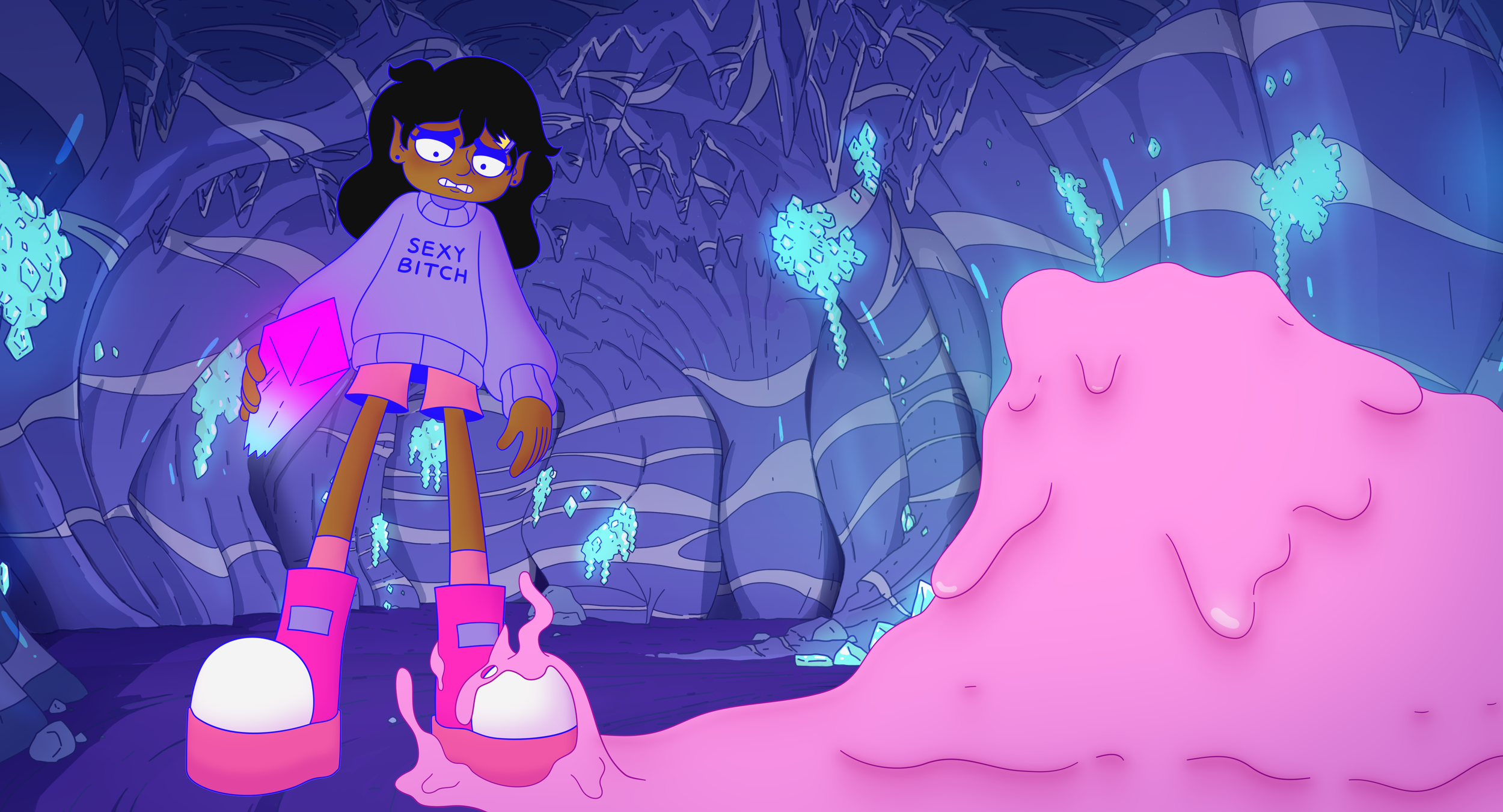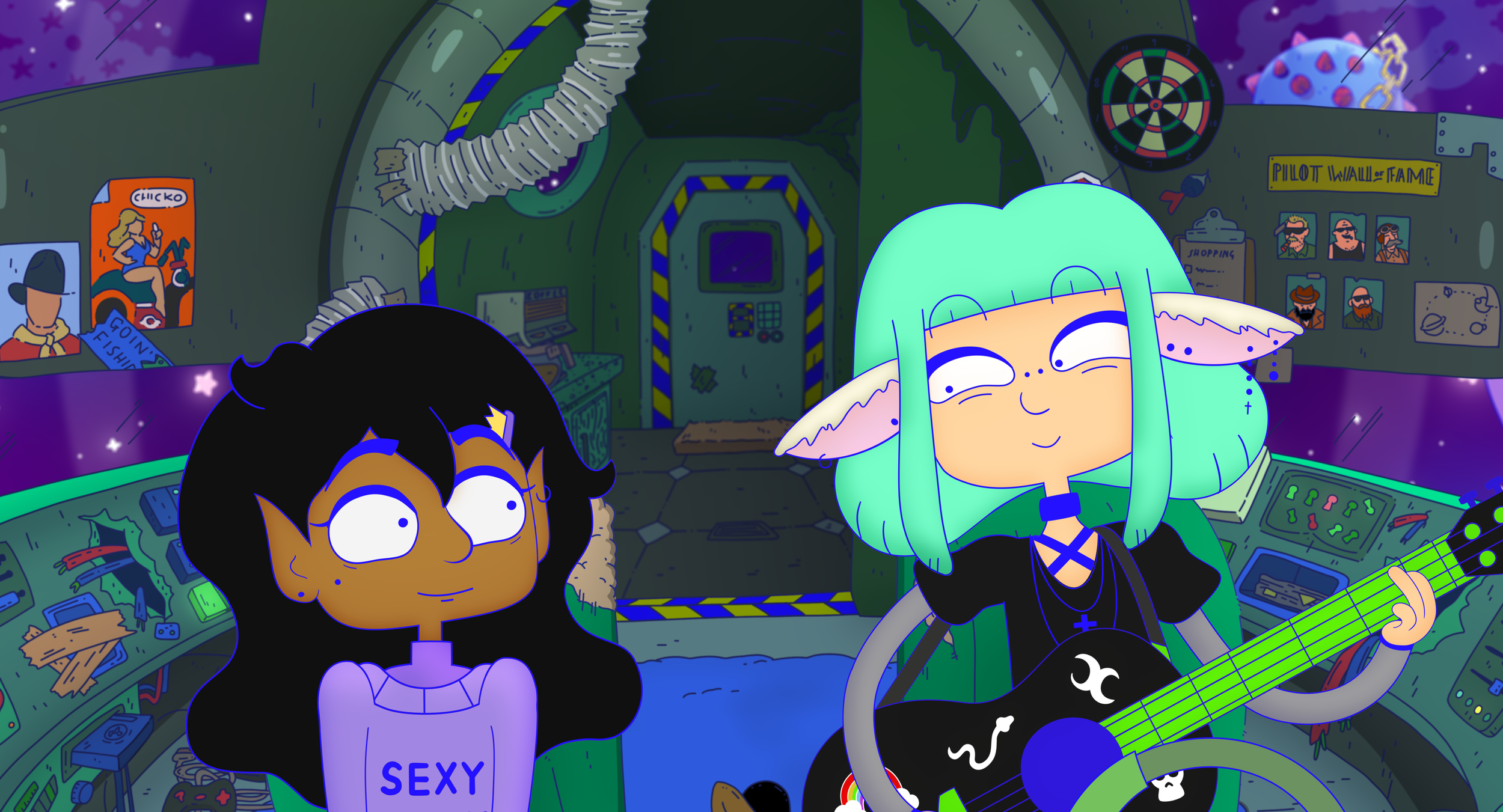
Lesbian Space Princess: Leela Varghese and Emma Hough Hobbs on the making of their animated queer feature film
@lesbianspaceprincessfilm
Words by Mina Wakefield (she/her)
Images by Kyahm Ross, Ronny Heine, Brigitte Dummer
Lesbian Space Princess marks the first feature film co-written and co-directed by Leela Varghese (she/her) and Emma Hough Hobbs (she/her), are a duo who have established themselves within the South Australian film scene. As the film makes its way through film festivals, they sit down with me to reflect on the intense journey of creating a feature film with an ambitious deadline. We discuss the dynamics of co-directing and co-writing, their experiences of navigating a male-dominated film industry, and the profound impact of creating a queer film that resonates with queer audiences.
Lesbian Space Princess, which premiered at the Adelaide Film Festival, is a personal story for the co-directors. True to its title, the story centres around an introverted space princess forced to leave her home planet on a mission to save her bounty hunter ex-girlfriend from evil white Maliens. The film is a celebration of queer joy, and a true representation of media made for queer people, by queer people.
Chatting with Leela and Emma, I asked about their introduction to the film industry, eager to know more about their journey to directing this excitingly successful film. For both, their love for cinema began well before their studies. For Leela, it was her love of TV as a child, and then a path from theatre into film. For Emma, it was a long-standing fondness for animation.
“I used to watch nothing but animation my whole life.”
While feeling very fulfilled with her work as a props master for South-Australian-based films, the opportunity to co-create a feature film with a greater sense of creative control meant that she could channel her love for animation directly.
“The animation side has always been something I’ve dabbled in, so we decided to combine our strengths to make this film.”
The idea for Lesbian Space Princess started with the Film Lab New Voices initiative. After some back-and-forth about who should apply, they decided they wanted to do it together. Then quite serendipitously, the name came to Emma, and from there, the story began to take shape.
With a strong name established, next came the central premise with its classic inspirations. From there, after a slew of media sharing, Lesbian Space Princess developed into a unique concept with fully realised, emotionally nuanced characters and a confident sense of genre, blending space westerns and rescue narratives with the tone and structure of a romantic comedy.
Reflecting on the early stages of the idea, Emma recalls, “We had the title, and with that came the very typical pitch, a Cowboy B Bop… your typical sci-fi thing. Then Leela took that and said, ‘Well, that’s not that interesting or original, let's flip it and make characters that are more like us, one who’s an introvert, one who’s anxious, and let’s not do the typical action thing'. So that’s when it ended up being more of a coming-of-age rom-com because Leela loved romcoms too.”
Emma adds, “I was getting to show Leela all my favourite animated movies, and Leela was getting to show me all her favourite romcoms.”
As partners, co-directors and co-writers, this film required collaboration and serious compromise. The writing stage was slightly more forgiving as nothing felt completely set in stone yet.
“When you’re co-writing, you kind of let each other’s things slide because it’s not actually the film going into production, so you know it’s not necessarily the final product”, Leela jokes.
During the writing stage, the pair found their collaboration smooth and relatively easy. It was during the directing process that – though they complement each other's skills – they faced more challenges.
“The hardest thing is that we are together, we were working together and we live together”, Emma reflects. “The potential for the film to take over a director’s life was even more [amplified]. We’d be waking up at 3 or 4 am, having solutions to our problems, and we’d wake each other up and be like ‘Babe, I’ve got it’.”
“Film making – people think is always fun, but it’s 10 per cent fun and 90 per cent stressful”, Leela emphasises.
However, the hard work paid off. Their creative freedom allowed for a highly personal story to be realised in film; a story of empowerment and self-acceptance.
For Leela, it’s about creating a world where voices often left unheard can thrive. “It’s a celebration of all the voices that we’re amplifying, which also happen to be our voices. It’s about making people feel empowered. We’ve created a world where the voices in typical societies that are the minority, in our film, are the most powerful people – I hope that it’s an escapism”.
Leela chuckles, adding, “We say that for 86 minutes you rule the Gay-laxy”.
Both Leela and Emma found importance in creating a film that truly aims to represent queer voices, not just the hardships but also the joy, love and empowerment that can come from the queer experience.
“It’s so refreshing that the film is filled with humour, and the characters are highly relatable to us”, Emma agrees.
For Leela and Emma, the film is about sharing the joy of queer connection – the comfort, humour and shared understanding that comes from telling stories with and for queer people. Reflecting on the film screening in Berlin, Emma recalls the cheerful atmosphere of the event.
“The best thing about Berlin was being in rooms with 800 queer people and allies who were just there to have fun and laugh.”
They also stress that they don’t want to be the only voice in that space. By creating a story that amplifies squashed voices, they hope it will open doors for more people.
Emma specifically aligns this with her own experience as a child. “I grew up not having animation made for women, let alone queer women, so I didn’t feel safe in nerdy spaces. If you create the content that’s not dominated by men, then those spaces open”
Like many, the film industry is objectively male-dominated. For Emma, it doesn’t necessarily feel like there are concrete barriers but rather, an air of dismissal and doubt because you’re queer, or a woman.
“I think a lot of people look at us and go ‘oh yeah, they’re cute’. Even in the funding rounds when we were trying to get the money, I feel like people were thinking we didn’t have a chance of being successful”.
It can be tricky when faced with disregard, especially when you know that there’s an audience for the story you have. The most important thing is not letting other people’s impressions change the importance of what you believe you’re doing.
“You know it matters to you, and it matters to a whole bunch of people like you.”
Leela also accepts that these are everyday challenges you’ll have to face, but she stresses the value of pushing through regardless.
“You can’t let anyone get in the way of telling a story, telling your story. Persistence is something that I always think about. There are so many ups and downs in every person's career, no matter who you are. The one thing you can control is whether you keep going.”
She also emphasises that although certain people have their ideas of what might work, they’re not always right.
“There are so many underfed audiences. Just because people don’t understand those audiences doesn’t mean there isn’t a hunger for content from them. Whether people in positions of power in the film industry can see it or not, the success of the film so far has already proven that.”
As a final thought, I asked for some advice for emerging queer filmmakers and storytellers.
Emma expressed simply “To make queer content for queer people”.
“That’s ultimately the most exciting thing for the community because you’re not trying to be this version of queer media that non-queer people want.” She adds.
Leela adds to her point from earlier, “Don’t let setbacks stop you from continuing to pursue your dreams. Just see that as the journey, pick yourself up from the losses and celebrate the wins as much as possible.”
As Leela and Emma continue to bring Lesbian Space Princess to film festivals worldwide, their journey is a testament to creating the stories you love and the worlds you want to see. In an industry that can feel overwhelming and inaccessible, they have carved out a universe where queer joy, love and fantasy can take centre stage and hopefully, pave the way for many more films like it.




